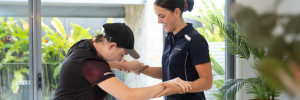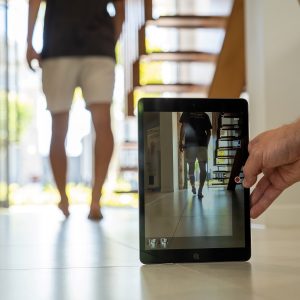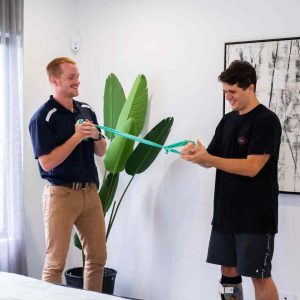Innovations in Mobile Healthcare: What’s Next?

Mobile healthcare in the realm of allied health refers to the innovative delivery of therapeutic services beyond traditional clinical settings. It leverages technology and flexibility to bring physiotherapy, occupational therapy, dietetics, remedial massage, and other allied health services directly to individuals in their homes, workplaces, or any convenient location. This approach emphasises accessibility, convenience, and personalised care through the integration of mobile technologies and healthcare services.
The significance of mobile healthcare innovations in allied health disciplines cannot be overstated. It represents a paradigm shift in how individuals receive crucial therapeutic interventions, offering several key advantages:
- Accessibility: Mobile healthcare brings essential allied health services directly to individuals, eliminating geographical barriers and ensuring that individuals, regardless of their location, can access necessary care.
- Convenience: By removing the need to travel to a clinic, mobile healthcare enhances the convenience of receiving services. This is particularly beneficial for those with mobility issues, busy schedules, or those residing in remote areas.
- Personalised Care: The mobile healthcare model allows for a more personalised and patient-centric approach. Therapists and practitioners can tailor interventions to the specific needs of the individual within the comfort of their familiar environment.
- Improved Compliance: The convenience of receiving allied health services at home or work often leads to increased patient compliance. Individuals are more likely to adhere to prescribed treatments, exercises, and dietary plans when integrated into their daily routines.
- Enhanced Continuity of Care: Mobile healthcare facilitates continuous monitoring and adjustment of treatment plans. Therapists can better understand the impact of interventions on an individual’s daily life and make real-time adjustments for optimal outcomes.
In the following sections, we will delve into the emerging trends and innovations that characterise the landscape of mobile healthcare in physiotherapy, occupational therapy, dietetics, and remedial massage. These advancements underscore the commitment to providing effective, accessible, and patient-centered care in allied health.
Emerging Trends in Mobile Allied Health

- Telehealth and Virtual Consultations for Therapeutic Services
The emergence of telehealth and virtual consultations has revolutionised therapeutic services in allied health. Telehealth enables physiotherapists, occupational therapists, dietitians, and remedial massage therapists to connect with individuals remotely. Through secure online platforms, practitioners can conduct assessments, consultations, and even deliver therapeutic interventions, ensuring continuity of care without physical proximity constraints.
- Integration of Wearable Technologies in Physiotherapy and Occupational Therapy
Wearable technologies have become integral in the fields of physiotherapy and occupational therapy, providing real-time data and insights into an individual’s movements and activities. Smart devices, such as motion sensors and fitness trackers, enable therapists to monitor progress, track adherence to exercises, and make data-driven adjustments to treatment plans. This integration enhances the precision and effectiveness of therapeutic interventions.
- AI-Assisted Treatment Plans and Customisations in Dietetics
Artificial Intelligence (AI) is playing a pivotal role in customising dietetic interventions. AI algorithms analyse an individual’s dietary habits, preferences, and health data to create personalised nutrition plans. Dietitians can leverage AI to provide real-time feedback, dietary adjustments, and even predict trends in nutritional needs. This ensures that dietary plans are tailored to each person’s unique requirements for optimal health outcomes.
- Remote Monitoring and Exercise Prescription in Mobile Physiotherapy
Mobile physiotherapy has embraced remote monitoring and exercise prescription through innovative technologies. Physiotherapists can remotely monitor an individual’s progress, assess movement patterns, and prescribe exercises through digital platforms. This not only facilitates consistent engagement in rehabilitation but also allows for timely adjustments based on real-time feedback, optimising the effectiveness of physiotherapeutic interventions.
- Incorporation of Mobile Apps for Health Management in Remedial Massage
The incorporation of mobile apps has transformed how remedial massage is delivered and managed. These apps provide platforms for individuals to schedule appointments, access educational resources, and receive personalised self-care recommendations. Remedial massage therapists can use these apps to provide aftercare instructions, track progress, and ensure a holistic approach to musculoskeletal health beyond the massage session.
Challenges and Future Considerations in Mobile Allied Health

Implementing mobile healthcare innovations in allied health is not without its challenges. Addressing these challenges is crucial for ensuring the seamless delivery of services:
- Technological Barriers: Overcoming technological barriers, such as ensuring accessibility for individuals with varying levels of tech literacy, and addressing connectivity issues in remote areas, is essential for the widespread adoption of mobile healthcare innovations.
- Data Security and Privacy: Ensuring the confidentiality and security of sensitive health information transmitted through mobile platforms is paramount. Implementing robust data protection measures and compliance with healthcare regulations are ongoing challenges that require constant attention.
- Standardisation of Practices: Achieving consistency and standardisation in mobile allied health practices is challenging due to the diverse nature of therapeutic services. Establishing industry-wide standards and guidelines for mobile physiotherapy, occupational therapy, dietetics, and remedial massage is critical for quality assurance.
- Reimbursement and Funding Models: Developing sustainable reimbursement and funding models for mobile healthcare services is a persistent challenge. Advocating for equitable reimbursement structures that reflect the value of mobile allied health services is crucial for the long-term viability of these innovations.
Looking ahead, several advancements and integrations are anticipated to shape the future of mobile allied health:
- Enhanced Telehealth Capabilities: Future advancements in telehealth technologies will likely include more sophisticated virtual reality applications, allowing for immersive therapeutic experiences and assessments.
- IoT Integration for Real-Time Monitoring: The integration of Internet of Things (IoT) devices for real-time monitoring in mobile physiotherapy and occupational therapy can provide even more accurate and detailed insights into an individual’s movements and activities.
- Advanced AI-driven Personalisation: AI algorithms will continue to evolve, enabling even more precise and personalised treatment plans in dietetics. Predictive analytics may play a larger role in anticipating nutritional needs and health trends.
- Remote Sensing for Remedial Massage: Future developments may involve incorporating remote sensing technologies in remedial massage, allowing therapists to assess muscle tension and tissue health remotely for more targeted and effective interventions.
Collaborations and synergies across healthcare sectors can enhance the impact of mobile allied health services:
- Interdisciplinary Collaboration: Encouraging collaborative efforts between physiotherapists, occupational therapists, dietitians, and remedial massage therapists can lead to comprehensive care plans that address multiple facets of an individual’s health.
- Technology Partnerships: Collaborating with technology providers can lead to the development of specialised platforms tailored to the unique needs of mobile allied health services, ensuring optimal user experience and data security.
- Government and Policy Involvement: Advocating for supportive government policies and incentives can foster a conducive environment for the growth of mobile healthcare. Engaging policymakers in discussions about reimbursement models and regulatory frameworks is essential for sustained success.
By proactively addressing challenges and embracing future considerations, the landscape of mobile allied health can evolve to provide more accessible, personalised, and effective therapeutic services for individuals across diverse settings.
Make the most of your mobile allied health care journey with Team Rehab Solutions. Reach out by filling out our form on our Contact Page or call us on 1300 685 046 for more information.
